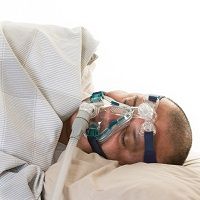Article
Patients with Spinal Injuries More Likely to be Fatigued, have Sleep Apnea
Author(s):
A new international study has found patients with spinal cord injuries were 7 times more likely to be fatigued and more than 3 times more likely to have sleep apnea than their able-bodied counterparts.

A new analysis has unearthed a startling revelation regarding sleep and fatigue issues and how they can contribute to an increased risk of stroke for people with spinal cord injuries.
The international study revealed patients with spinal cord injuries were at an increased risk of sleep-disordered breathing and a 7 times greater chance of experiencing chronic fatigue compared to their able-bodied counterparts.
"It's not just about a good night's sleep,” said investigator Jordan Squair, PhD, a post-doctoral scholar in the Phillips lab. “Our study found sleep related disorders are negatively associated with brain health for individuals with spinal cord injury."
To evaluate what was causing increased prevalence of cerebrovascular injury among patients with spinal cord injury, the investigators’ analyses explored the rate of fatigue and sleep apnea in patients with spinal cord injuries and potential associations with abnormal cerebrovascular activity. For the current study, investigators included data on more than 60,000 able-bodied individuals and more than 1800 individuals with a spinal cord injury.
Physiologic assessments were performed on homogenous sample of study participants with cervical injuries and matched controls. For the present analyses, investigators gauged the prevalence of self-reported chronic fatigue, clinically defined sleep apnea, and cerebrovascular responsiveness to changing CO2 levels.
Upon analyses, investigators observed individuals with spinal cord injury were 7 times more likely to experienced fatigue than those without an injury (OR 7.9, 95% CI 3.5 — 16.2). Analyses also revealed the rate of sleep apnea was more than 3 times greater in patients with a spinal cord injury (pooled OR 3.1, 95% CI 1.3–7.5). Investigators also pointed out a correlation between fatigue and trouble sleeping with level and severity of injury was observed.
Based on the results of their analyses, lead investigator Aaron Phillips, PhD, assistant professor, in the Department of Physiology & Pharmacology, suggests clinicians should keep a more watchful eye on the sleep-related issues that could impact patients with a spinal cord injury.
"Our results make a case for health-care professionals to incorporate assessments of fatigue and sleep-related breathing examinations into routine care for people with spinal cord injury," said Phillips in a release. "In addition, the use of a continuous positive airway pressure device may provide wide-ranging benefits for this group of people, including the reduction of stroke risk."
This study, titled “Sleep-disordered breathing is associated with brain vascular reactivity in spinal cord injury,” is published online in Neurology.





